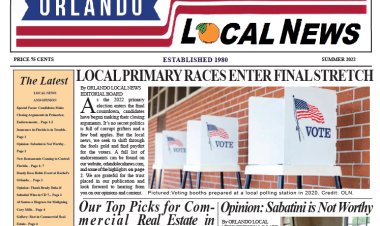Courts Toss Challenges to DeSantis Map

An appeals court Friday tossed out a temporary injunction that would have blocked the use of a congressional redistricting plan that Gov. Ron DeSantis pushed through the Legislature in April.
Friday’s decision came on the final day of a formal qualifying period for this year’s elections. Candidates qualified under the DeSantis-backed plan, which could increase the number of Republicans in the state’s congressional delegation from 16 to 20, based on past voting patterns.
The ruling by a three-judge panel of the 1st District Court of Appeal was expected: The panel had earlier placed a stay on the temporary injunction, describing it as “patently unlawful.”
The panel of the Tallahassee-based appeals court overturned a temporary injunction issued May 12 by Leon Circuit Judge Layne Smith, who also called for using a different congressional map.
“We conclude that the trial court abused its discretion when it rendered the temporary injunction order,” the four-page ruling by appeals-court Judges Harvey Jay, M. Kemmerly Thomas and Adam Tanenbaum said. “It is an unauthorized order and legally cannot remain in place.”
Voting-rights groups and other plaintiffs filed the lawsuit in April after DeSantis muscled the plan through the Legislature as part of the once-a-decade reapportionment process.
The case centers on Congressional District 5, which in recent years has been a sprawling North Florida district drawn to help elect a Black member of Congress. DeSantis argued that continuing with such a district would involve racial gerrymandering and violate the Equal Protection Clause of the U.S. Constitution.
His plan also reduced the number of Black voters in District 10 in Orlando currently held by U.S. Rep. Val Demings, now a candidate for U.S. Senate.
The Legislature approved DeSantis’ proposal to revamp the district, condensing it in the Jacksonville area. But Smith ruled the plan violated a 2010 state constitutional amendment — known as the Fair Districts amendment — that barred diminishing the ability of minority voters to “elect representatives of their choice.”

 Local News Staff
Local News Staff 
















